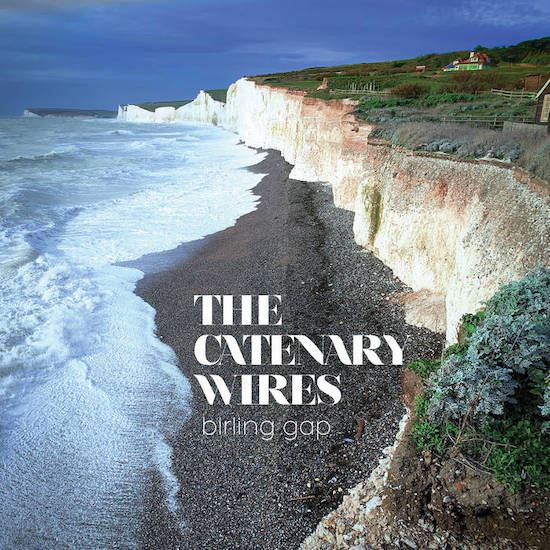For a chilling reminder of nostalgia’s dark side, you need only flick over to Britain’s latest 24-hour news channel. Serving up more flushed outrage than a Wetherspoons board meeting, GB News is a fever dream vision of a Britain – well, an England – that never really existed but which has now been conjured out of the hellfire of a collective longing for a half-imagined yesteryear.
The lesson is that luxuriating in the honeyed glow of a dimly-remembered golden past isn’t always healthy. That is likewise the message conveyed in occasionally serious yet frequently delightful fashion by dream-pop icons Amelia Fletcher and Rob Pursey, formerly of Heavenly, Tender Trap, and Talulah Gosh. As The Catenary Wires, they serve up something old and something new – while delivering a damning critique of their middle-aged generation: the one that has led the charge for Brexit and helped GB News to the top of the ratings.
Birling Gap takes its name from an enclosed pebble beach at the bottom of the Cliffs of Dover. The White Cliffs, of course, mark the end of England and stare out upon a sea that has brought waves of invaders, migrants, and trading partners ferrying fruit and veg, vinyl records, and just-in-time ready meals.
With a title like that, it doesn’t take much digging to work out what the record is about. It is in dialogue with Englishness: in particular the yearning for a Narnia-esque England where the beer is always warm, a picture of the Queen hangs above every fireplace, and where the Channel functions not as a conduit to the world but a barrier to keep out foreigners.
That spirit of self-satisfied insularity is evoked powerfully on the darkly jangling ‘Three Wheeled Car’, in which we join an old couple driving their Reliant Robin to Dover. “We will gaze out to the sea, we’ll conjure up old enemies and feel safe and warm,” croons Pursey. “Misremember the past, it’s our national persona,” adds Fletcher, her voice the dewy missing link between Liz Fraser and Tracey Thorn.
These are stark images. However, the miracle of Birling Gap is that it wrestles with bleak themes even as it summons an evergreen indie romanticism. Guitars twinkle and chug. Horns parlay the spirit of early Belle and Sebastian. Fletcher’s vocals crowd-surf over melodies that, if never quite twee, might be, in the very best sense, characterised as “twee-adjacent”. And bucket-loads of angst are poured on dirges such as ‘Like The Rain’, which builds to a devastating coda via a chorus that sweetly shrieks, “It’s over, it’s over”.
Yet if Birling Gap is weighed down with a heavy soul, it has a joyous heart too. The undoubted centrepiece is single ‘Mirrorball’, a hurricane of indie-schmindie exhilaration that tolerates no resistance. A love letter to vintage discos it sees Fletcher and Pursey finding love on the dance-floor as chart smashes from forty years ago flutter in the background.
‘Mirrorball’ is defiantly carefree but with the moral that it’s okay to wallow in the past, provided you confine yourself to old pop hits and don’t try to destabilise the country as you’re doing so. Amid the crashing waves of despair and anger that sometimes dominate The Catenary Wires’ third LP, its optimism shimmers like a supernova.


